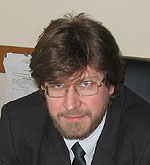© «Russia
in Global Affairs». № 4, October
— December 2006
 On the eve of the 15th anniversary of the breakup of the
On the eve of the 15th anniversary of the breakup of the
Soviet Union, it has become particularly obvious that Russia has
not only failed to overcome the consequences of that dramatic
event, but has even failed to rethink them. Russia’s task of
forming a new national identity reveals a never-ending road of
pitfalls, ranging from its search for a place in the world, to its
attitude to neighboring countries, to exacerbated interethnic and
inter-cultural problems in Russian society. In this issue, our
authors summarize some of the results of those turbulent 15
years.
In an
article contributed to our journal, Roderic Lyne, Strobe Talbott
and Koji Watanabe, members of the Trilateral Commission, write that
“the traumatic effect of the collapse of the Soviet Union tends to
be underestimated.” The breakup of the once unified geopolitical
and cultural space, coupled with an acute economic crisis, caused
many citizens of the Russian Federation to actually believe it was
the end of the world. Today, the country is finally recovering from
that state of shock, although it is still undecided as to what
direction it should take now. Historian Dmitry Furman argues that
Russia’s leaders, having failed to achieve stable democratic
development, have instinctively begun to build what they were
accustomed to before – a system of personal rule. President Putin
hesitates to make the final step toward full authoritarianism,
Furman believes, although that would be the logical completion of
the process.
Leonid
Grigoriev and Marsel Salikhov in their joint article emphasize what
they describe as the main problem of a majority of the post-Soviet
countries: the loss or drastic worsening of the quality of human
capital. They insist it is this factor, rather than formal growth
figures, that must be the main criterion in assessing the state of
the newly independent countries. This subject is followed up by
demographer Serguey Ivanov, who concludes that Russia will
inevitably face the need for mass labor immigration. He warns,
though, that this process will entail another very acute problem –
the growth of xenophobia and intolerance in the country. Modest
Kolerov, the head of the Russian President’s Department for
Inter-Regional and Cultural Ties with Foreign Countries, writes
that nationalism is the basis of independent development of all the
states in the former Soviet Union. Philosopher Alexander Dugin,
reflecting on the tragic events in Russia’s Karelia region in
September, which showed that the potential of aggressiveness
against people of other nationalities has reached a dangerous point
in Russia as well, offers his solutions to confronting this
problem. Along similar lines, sociologist Nikolai Mitrokhin
analyzes various kinds of non-Islamic extremism in Russia, while
Orientalist Alexei Malashenko writes about the image of Islam as
seen through the eyes of Russian society. Diplomat and politician
Mikhail Demurin argues that Russia must return to its national
roots.
State Duma
deputy Andrei Kokoshin, an advocate of the popular Russian theory
of “sovereign democracy,” analyzes the political aspects of the
formation of the Russian state. He insists this concept will enable
Russia to overcome the aftermath of the cataclysms it has suffered
in the last 15 years, and to take the road of stable democratic
development. Professor Robert Legvold offers his view on how the
United States should treat Russia, which habitually turns a deaf
ear to recommendations from the West.
It is
impossible for Russia to strengthen its sovereignty without a
clearly formulated economic strategy, the core of which is the
energy sector. In this issue, three economists argue over
priorities for Russia’s official energy policy. Mikhail Dmitriev
draws the readers’ attention to the rapidly developing Asian
markets; Vladimir Milov insists that Russia must consolidate its
ties with the European Union; while Mikhail Delyagin offers a
concept of “energy egotism” as a necessary element for the
country’s modernization.
This issue
also carries an article by scholar Farkhod Tolipov of Uzbekistan,
who analyzes the geopolitical dilemma faced by Central Asia, and an
essay by outstanding Cuban author Carlos Alberto Montaner
concerning the last period in Fidel Castro’s rule and the prospects
for his country.
Next year,
Russia in Global Affairs will closely follow developments in the
rapidly approaching elections to the State Duma, as well as
preparations for the next presidential race. Certainly, the
struggle for power will have an impact on Russia’s foreign policy
and relations with its major partners. We will attempt to shed some
light for our readers on what actually happens inside the arena of
Russian politics, which is an exciting and, at the same time,
incomprehensible area even for many of its active
players.










